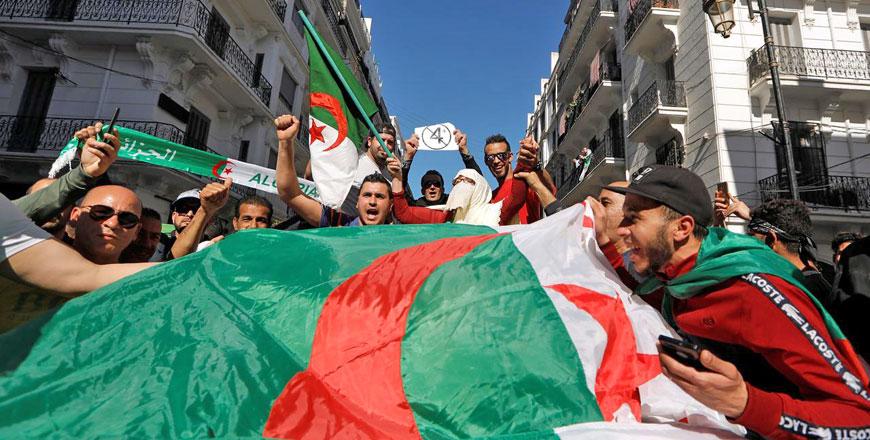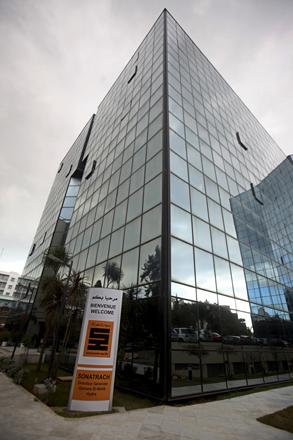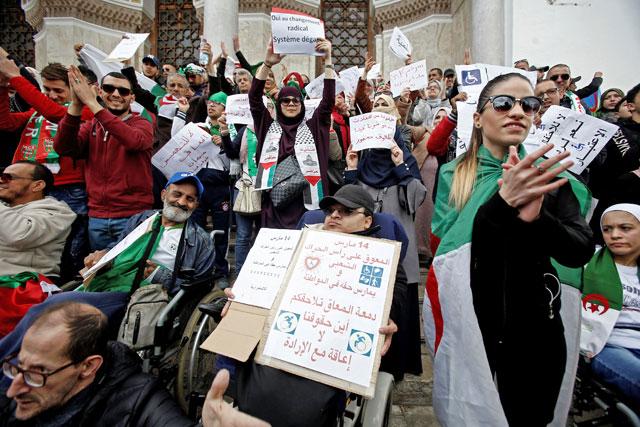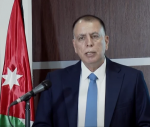You are here
Algeria PM starts talks on new Cabinet as gas field workers protest
By Reuters - Mar 17,2019 - Last updated at Mar 17,2019
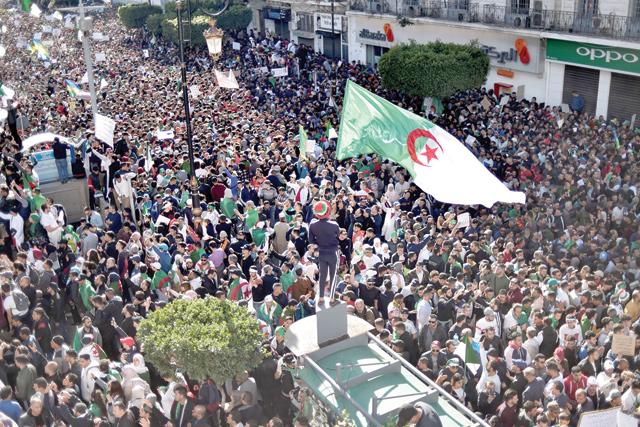
Algerians demonstrate during the first Friday rally since the president's surprise announcement this week that he would not seek reelection but was cancelling April polls, in central Algiers, on Friday (AFP photo)
ALGIERS — Algeria's newly-appointed prime minister has started talks to form a new government, state media reported on Sunday, in a move designed to placate protesters demanding President Abdel Aziz Bouteflika and his inner circle step down.
The discussions began as some workers at Algeria's biggest gas field staged a protest against "extending the fourth term", an energy official said, referring to a proposal by Bouteflika to stay in office until a new constitution is adopted.
Output at the Hassi Rmel field was not affected, said the official from state oil and gas company Sonatrach.
He described the protests as “minor”, but such politically-motivated action suggests Algeria’s reform push has won some influence inside an enterprise that is the north African country’s main economic pillar.
Algerians, who have been demonstrating for over three weeks, have rejected overtures by Bouteflika, who has reversed a decision to stand for another term after 20 years in power.
Bouteflika stopped short of relinquishing office and said he would stay on until a new constitution is adopted, in effect extending his fourth term in office, meaning he will likely remain in power for some time.
State news agency APS reported that the new Cabinet would include experts without political affiliation and will “reflect the demographics of the Algerian society”.
The aim is to “show willingness to establish a government of great openness”, APS quoted an official source as saying.
However, Prime Minister Noureddine Bedoui is unlikely to defuse anger on the streets simply by starting talks on a new administration.
“The new government will fall in 24 hours as long as it lacks legitimacy and popular support,” said Fodil Boumala, one of the people protesters have chosen to spearhead popular pressure against what they see as an authoritarian system.
Promises of reform
Algerians have previously heard promises from Bouteflika, who has hinted at wide ranging political reform and steps to improve an economy which has offered many Algerians few opportunities despite the country’s oil and natural gas wealth.
Protesters have grown tired of the same ruling elite, veterans of the 1954-1962 war of independence against France, the military, intelligence agencies and big businessmen.
Algerians have made it clear they will only settle for new leaders who can improve living standards, deliver greater freedoms and dismantle a Soviet-style bureaucracy that has discouraged investors.
On Friday, hundreds of thousands of people staged the biggest demonstration since the unrest began. Some carried banners saying “No to Bedoui”.
Bouteflika has rarely been seen in public since suffering a stroke in 2013. Protesters say he is no longer fit for office.
The president has been losing allies in recent days since returning from medical treatment in Switzerland, including senior members of the ruling National Liberation Front party, known by its French acronym FLN.
Protests have been mostly peaceful, with security forces showing restraint. The military, which is expected to keep playing its influential behind-the-scenes role as a power broker, has stayed in the barracks.
Giving details of the gas field protests, the head of Sonatrach’s communication department Mounir Sakhri told Reuters that production at both Hassi Messaoud and Hassi Rmel fields was still flowing as usual.
“[There were] some minor protests that did not affect our business,” Sakhri said.
Algeria is an important gas supplier to Europe, mainly Italy, Spain and France. Its oil output is about one million barrels per day, and gas output is about 135 billion cubic metres per year. Several foreign firms operate in the country including BP, Total and Repsol.
In the 1990s, oil and gas production never stopped despite the country’s descent into chaos.
Related Articles
ALGIERS — Hundreds of thousands of people protested in central Algiers on Friday in the biggest demonstration against President Abdelaziz Bo
ALGIERS — After a deep slide in oil prices, Algeria's Sonatrach is shifting strategy to offer foreign firms direct negotiations to buy stake
ALGIERS — Algeria's new prime minister sought to calm tensions Thursday ahead of planned demonstrations that could be decisive for the prote


